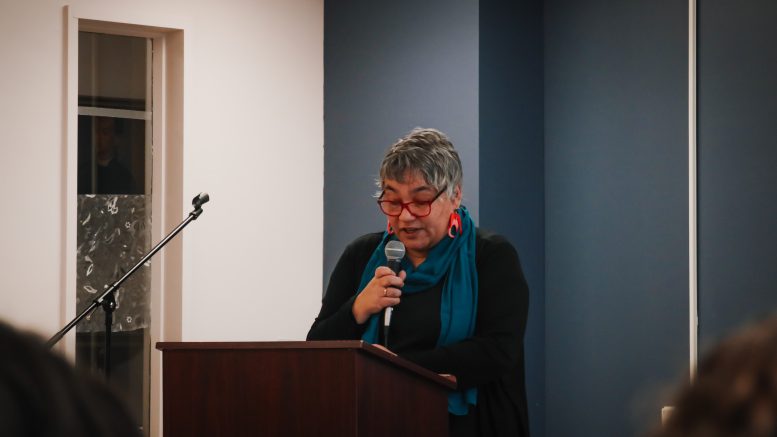On Jan. 22, U of M officially welcomed Sonja Boon as this term’s writer-in-residence at the Centre for Creative Writing and Oral Culture.
A welcome event took place in St. John’s College where Boon read one of her poems and an excerpt from her memoir What the Oceans Remember: Searching for Belonging and Home. Other speakers included arts faculty members Nancy Kang and Jocelyn Thorpe, as well as second-year arts student Aevan Caples, who read a short story she had written.
Boon is originally from the U.K. where she was born to her Surinamese mother and Dutch father. She moved to Canada at the age of five and has lived across the country, from Vancouver to St. John’s. Before relocating to Halifax in 2023 to focus on her writing, she worked as a professor of women’s and gender studies at the Memorial University of Newfoundland for 15 years.
Given her complex ethnic background, Boon published her memoir in 2019 exploring her transcontinental lineage. Boon explained that she will continue to work on the project as the writer-in-residence.
“In my memoir, two of the people that I follow are my great-grandfather and my great-great-grandmother,” she said. “They both came from what was then Calcutta, to Paramaribo, Suriname, in South America. And they left in 1873, they arrived in 1874 where my great-great-grandmother took up a position as an indentured labourer.
“They left nothing in their own hands because they were both illiterate […] There are very few first-hand accounts of what those journeys were like for people […] What does exist is a ship’s log, so the captain kept the ship’s log, and then immigration records.”
While this story may seem like a personal inquiry into one’s heritage, it sheds light on the global political economy of the early 19th century. According to the Rijksmuseum, labourers were recruited from India to work on plantations after the abolishment of slavery in the then Dutch colony of Suriname.
Many Indians accepted contracts to provide relief to their famine-stricken families back home, but were met with poverty and violence upon arrival. In her book, Boon writes that Calcutta suffered droughts and poor harvests at the time, making her great-great-grandmother’s trek from India to South America difficult and lonely.
Boon may never find concrete details about her ancestors’ lives, but she plans to create her own narratives to make sense of this part of her lineage.
“I’m going to draw on those [sources] to create what I see as imagined conversations between this mother and this very young child as they try to find meaning in terms of what’s happening, about what is this big journey that they’re taking? Why are they leaving India, and what happens when they arrive in Suriname?” she said. “That’s my big, my main writing project that I’ll be working on while I’m here.” In addition to creative writing and academic research, Boon is a professional flutist and music teacher who served as the principal flutist of the Portland Baroque Orchestra until 2007. She is also a visual artist, blending her genealogical and archival research with textile arts to create “research-based artwork.”
Boon said her academic and creative endeavours all bleed into each other in one way or the other.
“Honestly, they’re all creative sparks, right? Each feeds the other. So, if I’m writing, then I’m also thinking about, like in my memoir, music came into there too, of course, right? Because I’m doing the research, like what kind of concerts were going on there? So I went looking through the historical newspapers and [thought] about concerts,” she said.
“Then I pulled out my flute to play some of the flute music that was being played, because they listed the program, which gives me, then, a sense of the sound of the period. What were people listening to at the time? And then thinking about audience, who was allowed into the audience? Who wasn’t?”
During her residency at U of M, Boon will host workshops on writing, stitching and quilting, as well as hold private sessions with students.
“I have the opportunity to meet one-on-one with folks every week […] I have called those ‘creative conversations,’ so people can, if they want, send me up to 10 pages of writing in advance, but it could be that they just want to brainstorm together,” she explained.
“It could be that they’re thinking about a project, and they just want to bounce ideas off someone, right? Or it could be that they’re thinking of bringing this together with that in a unique way, and they just want to chat about it.”
Finally, Boon emphasized the need for aspiring writers and creatives to trust themselves.
“If I had to give myself some more advice […] I would want my younger self to trust myself more,” said Boon.
“Trust yourself, trust that you know what you want to do, trust that you know that you will work out the way that you want to get there and trust that even if where you end up is not where you first expect it, it is where you were meant to be.”
Visit umanitoba.ca/arts/centre-creative-writing-and-oral-culture for details on upcoming workshops hosted by the U of M’s Centre for Creative Writing and Oral Culture. Learn more about Sonja Boon and connect with her at sonjaboon.com.


